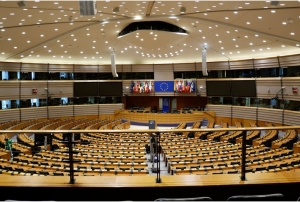Image Source: Jesus College Cambridge
The world of international law mourned in unison last week as news of the passing of James Crawford rippled through the international legal community. Indeed, no matter where in the world one has been initiated in the world of international law over the past 20 years, the name of James Crawford will have come up one way or another. The Creation of States, the Articles on State Responsibility, the Cambridge Companion, Brownlie’s Principles, the General Course in The Hague, and the vast number of arbitral awards (and later judicial decisions) have left a mark possibly unmatched by that of any other international lawyer of his generation.
My own thoughts on hearing of his passing have oscillated between reliving the many moments of kindness I have witnessed from James Crawford the man, on the one hand, and my reflections on the hole in the field left by his sudden absence, on the other. In my mental map, Professor (and later Judge) James Crawford was the ultimate representative in the Anglo-Saxon world of an ever-rarer breed that I would like to call ‘agnostic international legal scholars’.
International Law as Faith
Much like law in general, international law is built on faith. Faith that there is an in principle determinable, if concretely disputed and oftentimes violated, set of rules and principles of justice capable of underlying human decisions on who may have power over whom, who must suffer what consequences when things go wrong, and ultimately how coercion can be legitimately deployed to ensure the maintenance of an order. Upon reading scholars from Vitoria and Grotius to the 1980s, anyone in the 21st Century can only be astonished at how liberally they deploy the concepts of justice, morality, the common good, inherent right, and necessary obligation. Even Dionisio Anzilotti, known for being the ultimate international legal positivist, is often declaredly the champion of state interests and decisions as not only the existing but the morally legitimate source of legal rights and obligations – their (co)existence and mutual promises the ultimate moral grounding of international law.
The past decades have made this a priori faith in international law increasingly untenable. Although still politely rehearsed in high-level conferences, dexterously voiced by practitioners as a prelude to substantive pleadings, and reflexively taught to students in introductory courses, the notion that international law is a good in itself – a self-legitimating criterion for the correctness or incorrectness of arguments and state conduct – is at the very least seriously endangered. Attacks come not only from cynical outsiders but also from those who these outsiders might legitimately assume they are up against: international legal scholars, who one could expect would defend the legitimacy and inherent morality of international law.
And yet we don’t. International law has changed markedly since the 1980s, to the point where it is not even clear that faith in the inherent morality of international law is the orthodoxy in the discipline anymore. Seen through contemporary eyes, international law’s historical claim to being, if not always a model of justice, at least a bulwark against major forms of injustice, is hard to reconcile with the litany of horrors perpetrated over the centuries, not against but in the name of international law. Outside of hearing rooms and high-level meetings, international law’s reckoning with its unequal origins and history of exclusion has made it virtually impossible for scholars to proceed on the assumption that morally virtuous guidance and standards of justice derive from its tenets. In the centers of global legal knowledge production, gone are the days when great scholarship was assessed on its ability to record, analyze and systematize international law as practiced by states. Increasingly detached from the practice of inter-state argumentation, legal scholars are expected either to find a non-legal source for their claims to justice – and in this sense to become ‘heretics’ in the church of international law – or to accept international law as little more than fancy dressing for claims put forward by the powerful to sprinkle on their interest-based decisions a scent of legitimacy – and thus to become avowed non-believers.
The Agnostic International Lawyer: from the EEZ to Crimes against Humanity
It is within this conceptual battlefield that James Crawford managed to espouse what I am calling ‘agnostic’ international law. No longer able to profess faith in the inherent justice of whatever decisions states have made, the agnostic international lawyer must still somehow derive from their past promises and conduct some guidance regarding permissible future conduct. To be a scholar, an agnostic lawyer must be able not only to argue a case forcefully, when this is their role, but also to conduct an assessment of rights and obligations informed by legal considerations. Agnostic scholarship depends on (and maybe consists in) this assertion of a space in which legal arguments can be legitimately had, and not amount to mere legitimizing theater. Without an underlying faith in the coextensiveness of law and justice, the very possibility of a rule of law depends on the ability of individuals applying rules – whether as final adjudicators, as legal advisors or as commentators – to maintain that there is nonetheless an objective measure of right and obligation different from their subjective measure of goodness: that there is a ‘law’ that does not automatically match their own or a patron’s momentary preferences and interests.
In this regard, Crawford’s go-to example was seemingly straightforward: what is a political scientist’s concept of the Exclusive Economic Zone (EEZ)? The routine answer – that there is none, other than the one in the United Nations Convention on the Law of the Sea – implied that this was the tip of a gigantic iceberg. If one can determine objectively whether an oil platform in inside or outside an EEZ, then it must also be determinable (if not mathematically calculable) whether a given state is authorizing fishing beyond its allotted quotas, giving too much in subsidies to sugar producers, violating the rights of ethnic minorities, or sponsoring crimes against humanity. By the same token, in each of these areas there must be scope for state conduct that, despite contradicting the lawyer’s personal views of what states should do or what the law should require, does not, in light of what the law is, amount to a legal violation.
At the heart of the agnostic (international) lawyer’s conception of law is the belief that, despite being the product of less-than-clear agreements among fallible humans acting in the name of imperfect states, law does provide a not infinitely malleable measure to assess conduct. Indeed, anyone who has been put in a position of having to evaluate another’s conduct according to a standard other than personal satisfaction – whether a student’s possible plagiarism or a subordinate’s meeting of performance targets – understands how quickly the evaluation becomes ‘legalized’, and tenets such as correspondence between conduct and stated requirement, treating like cases alike, and considering mitigating circumstances, become relevant. In the early days of the GATT, trade diplomats suddenly made dispute settlement panelists quickly found themselves revising their initially professed anti-legalism; their ‘non-legalistic’ approach to interpreting and applying the GATT soon became indistinguishable from a form of legal reasoning based on precisely these tenets.
James Crawford’s texts are a masterclass in agnostic international legal scholarship. Reading them, one can rarely pin down where he would stand on a specific case (‘where you stand’, he would sometimes quip, ‘depends on where you sit’). But the text always implies that a set of rules exists that can be objectively applied to factual circumstances. He was at his best distilling a wealth of state practice, case law, and assorted documents into clearly stated guiding principles, solid enough to provide guidance to someone genuinely seeking standards on which to ground a decision and flexible enough not to become outdated when faced with the next technological or conceptual fad. His likely longest-lasting contribution to international law, the completion of the Articles on State Responsibility, was done precisely by purging previous drafts of long lists of particular cases and exceptions to arrive at a set of generally applicable core rules.
Does Agnostic Legal Scholarship Have a Future?
With the man having left the stage, James Crawford will stay with us as text, permanently welcomed among our ‘most highly qualified publicists of the various nations’. There is no serious doubt that he will be among the go-to scholars for those seeking to ascertain, one or two centuries from now, the by-then-obsolete and likely a bit quaint mainstream views of international lawyers in the early 21st Century. A question that remains lingering, however, is whether there is still room in contemporary academia for the brand of legal scholarship that he epitomized for our generation.
For the foreseeable future, diplomats and practitioners will continue to produce and reproduce international law largely as they have done for a hundred years now, since the creation of the Permanent Court of International Justice launched the era of court-mediated international law. But there is an inevitable feeling that agnostic legal scholarship, focused on understanding international law and telling us what it is without avowedly seeking to bend it or upend it, is out of fashion. Would anyone encourage a young legal scholar to face novelty-seeking hiring committees and interdisciplinarity-hungry grant bodies with a project of scholarship that does not seek to portray international law as infinitely malleable language, implicitly or explicitly proposing either to reshape it as necessary to maximize an externally established set of criteria or to uncover it as an inexorable source of indefensible outcomes? Is there an alternative that allows us to recognize the value of a specifically legal approach to the challenges of the day, beyond the use of the claim to expertise as a source of legitimacy for one’s subjective preferences or a proposed dissolution of the language in which we frame our disputes, under the unarticulated assumption that this would lead the disputes themselves, and the human struggle that underlies them, to dissolve into harmony?
This is the challenge that poses itself before international lawyers seeking to adopt a fully thought through, and not merely pragmatically useful, agnostic approach to law as, surely, language, but language that can serve a mediating function in social relations and replace the prospect of absolute domination with that of peaceful coexistence among enfranchised individuals and communities. Here, as was perhaps inevitable, James Crawford’s pragmatic scholarship provides us with little in the way of theoretically articulated guidance. Even his most philosophically ambitious work, The General Course given at The Hague Academy, outlines the key tensions among the various potential forms and contents international law can have, while stopping short of providing an underlying theory for what it ought to be. Perhaps something had to be left for future generations. And maybe we should thank James for that as well – one final time.
-

Assistant Professor at the University of Amsterdam (UvA) Coordinator of the LL.M. in International Trade and Investment Law





